July 2016
Larks of Dean
20/07/16 22:02
Dean Lane is west of Burnley Road East in the village of Water and has given its name to two local choirs.
The first is the Deign Layrocks, active in the Water and Goodshaw areas between 1750 and 1860. Prominent embers included members of the Nutgall, Ashworth and Hudson families and Moses Heap, a well known local diarist. They composed much of their own music, some of which is recorded in Heap's music book, now preserved in the Whitaker Museum in Rossendale together with some of their instruments.
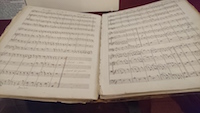
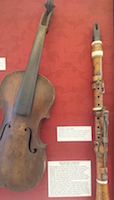
At that time a number of people walked over Coal Pit Lane from Water to Goodshaw to worship in the old Goodshaw Baptist Chapel (now in the hands of English Heritage) and the Friends' Meeting House. The link between the Layrocks and Goodshaw Old Chapel was strengthened by the involvement in the Layrocks of the Rev John Nuttall, minister at Goodshaw.
This description of their activities is allegedly from Edwin Waugh's 'Home Life of the Lancashire Factory Folk during the Cotton Famine' but I have not been able to confirm this.
"Up in the forest of Rosendale, between Deerply Moor and the wild hill called Swinshaw, there is a little lone valley, a green cup in the mountains, called "Dean." The inhabitants of this valley are so notable for their love of music, that they are known all through the vales of Rosendale as "Th' Deighn Layrocks," or "The Larks of Dean."
"In the twilight of a glorious Sunday evening, in the height of summer, I was roaming over the heathery waste of Swinshaw, towards Dean, in company with a musical friend of mine, who lived in the neighbouring clough, when we saw a little crowd of people coming down a moorland slope, far away in front of us. As they drew nearer, we found that many of them had musical instruments, and when we met, my friend recognised them as working people living in the district, and mostly well known to him. He inquired where they had been; and they told him that they had "bin to a bit ov a sing deawn i'th Deighn." "Well," said he, "can't we have a tune here?" "Sure, yo con, wi' o' th' plezzur i'th world," replied he who acted as spokesman; and a low buzz of delighted consent ran through the rest of the company. They then ranged themselves in a circle around their conductor, and they played and sang several fine pieces of psalmody upon the heather-scented mountain top."
More details of the Layrocks can be found in an article by Jean Seymour.
Today the Larks of Dene Quire claim to carry on the tradition. They appear to play mainly church music and so are part of the link between singing and faith, but are based in Bury and do not appear to have any connection with Dean or Goodshaw.
The first is the Deign Layrocks, active in the Water and Goodshaw areas between 1750 and 1860. Prominent embers included members of the Nutgall, Ashworth and Hudson families and Moses Heap, a well known local diarist. They composed much of their own music, some of which is recorded in Heap's music book, now preserved in the Whitaker Museum in Rossendale together with some of their instruments.


At that time a number of people walked over Coal Pit Lane from Water to Goodshaw to worship in the old Goodshaw Baptist Chapel (now in the hands of English Heritage) and the Friends' Meeting House. The link between the Layrocks and Goodshaw Old Chapel was strengthened by the involvement in the Layrocks of the Rev John Nuttall, minister at Goodshaw.
This description of their activities is allegedly from Edwin Waugh's 'Home Life of the Lancashire Factory Folk during the Cotton Famine' but I have not been able to confirm this.
"Up in the forest of Rosendale, between Deerply Moor and the wild hill called Swinshaw, there is a little lone valley, a green cup in the mountains, called "Dean." The inhabitants of this valley are so notable for their love of music, that they are known all through the vales of Rosendale as "Th' Deighn Layrocks," or "The Larks of Dean."
"In the twilight of a glorious Sunday evening, in the height of summer, I was roaming over the heathery waste of Swinshaw, towards Dean, in company with a musical friend of mine, who lived in the neighbouring clough, when we saw a little crowd of people coming down a moorland slope, far away in front of us. As they drew nearer, we found that many of them had musical instruments, and when we met, my friend recognised them as working people living in the district, and mostly well known to him. He inquired where they had been; and they told him that they had "bin to a bit ov a sing deawn i'th Deighn." "Well," said he, "can't we have a tune here?" "Sure, yo con, wi' o' th' plezzur i'th world," replied he who acted as spokesman; and a low buzz of delighted consent ran through the rest of the company. They then ranged themselves in a circle around their conductor, and they played and sang several fine pieces of psalmody upon the heather-scented mountain top."
More details of the Layrocks can be found in an article by Jean Seymour.
Today the Larks of Dene Quire claim to carry on the tradition. They appear to play mainly church music and so are part of the link between singing and faith, but are based in Bury and do not appear to have any connection with Dean or Goodshaw.
female clog-fighting
16/07/16 23:02
mmm - it's interesting what you can misunderstand…
The local museum, the Whitaker, recently had a weekend of 'traditional Rossendale customs'. Although the link of some of these with Rossendale was perhaps tenuous the material was interesting nevertheless. Unfortunately I missed the weekend itself but saw a leaflet on a recent visit and my eye was caught by an apparent exhibition of clog fighting by Mrs Anna FC Smith.
Interesting. Female clog-fighting was a new one to me.
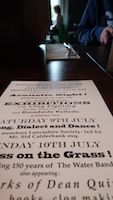
It wasn't, of course, what it seemed.
Anna FC Smith is an artist and social historian whose work depicting clog-fighting was exhibited at the museum in a series of tasteful and evocative pen and ink drawings with added blood.
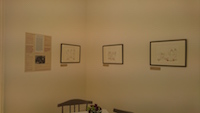
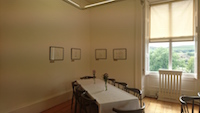
The activity was known as 'purring'. Mrs Smith describes it somewhat evocatively as having 'created a space for working men to rule their own lives and express pride and community under their own terms. The sport may have been violent, but, in the context of their lives, fighters displayed skill, sportsmanship, and bawdy good humour'.
It would be interesting to research the extent to which that was true. It would also be interesting to explore parallels with modern-day football hooliganism which could be described in similar terms.
I don't know the extent to which this took place in the area, but the Moorcock Inn on Rooley Moor Road between Rochdale and Backup was said to have been used for bare-knuckle fighting well away from any prying official eyes.
The local museum, the Whitaker, recently had a weekend of 'traditional Rossendale customs'. Although the link of some of these with Rossendale was perhaps tenuous the material was interesting nevertheless. Unfortunately I missed the weekend itself but saw a leaflet on a recent visit and my eye was caught by an apparent exhibition of clog fighting by Mrs Anna FC Smith.
Interesting. Female clog-fighting was a new one to me.

It wasn't, of course, what it seemed.
Anna FC Smith is an artist and social historian whose work depicting clog-fighting was exhibited at the museum in a series of tasteful and evocative pen and ink drawings with added blood.


The activity was known as 'purring'. Mrs Smith describes it somewhat evocatively as having 'created a space for working men to rule their own lives and express pride and community under their own terms. The sport may have been violent, but, in the context of their lives, fighters displayed skill, sportsmanship, and bawdy good humour'.
It would be interesting to research the extent to which that was true. It would also be interesting to explore parallels with modern-day football hooliganism which could be described in similar terms.
I don't know the extent to which this took place in the area, but the Moorcock Inn on Rooley Moor Road between Rochdale and Backup was said to have been used for bare-knuckle fighting well away from any prying official eyes.




